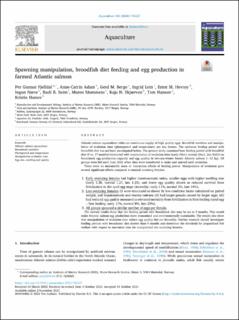| dc.contributor.author | Fjelldal, Per Gunnar | |
| dc.contributor.author | Adam, Anne-Catrin | |
| dc.contributor.author | Berge, Gerd Marit | |
| dc.contributor.author | Lein, Ingrid | |
| dc.contributor.author | Hevrøy, Ernst Morten | |
| dc.contributor.author | Næve, Ingun | |
| dc.contributor.author | Seim, Rudi R. | |
| dc.contributor.author | Mommens, Maren | |
| dc.contributor.author | Skjærven, Kaja Helvik | |
| dc.contributor.author | Hansen, Tom Johnny | |
| dc.contributor.author | Hamre, Kristin | |
| dc.date.accessioned | 2024-01-30T10:19:45Z | |
| dc.date.available | 2024-01-30T10:19:45Z | |
| dc.date.created | 2024-01-25T10:54:44Z | |
| dc.date.issued | 2024 | |
| dc.identifier.citation | Aquaculture. 2024, 580 . | en_US |
| dc.identifier.issn | 0044-8486 | |
| dc.identifier.uri | https://hdl.handle.net/11250/3114462 | |
| dc.description.abstract | Atlantic salmon aquaculture relies on continuous supply of high quality eggs. Broodfish nutrition and manipulation of ovulation time (photoperiod and temperature) are key factors. The optimum feeding period with broodfish diet has not been investigated before. The present study examined how feeding period with broodfish diet (9 vs. 17 months) interacted with manipulation of ovulation time (early (Nov), normal (Dec), late (Feb)) on broodstock egg production capacity and egg quality in two-sea-winter female Atlantic salmon (∼12 kg). All groups were fed until June 2021 when they were transferred to tanks and starved until ovulation. | en_US |
| dc.language.iso | eng | en_US |
| dc.title | Spawning manipulation, broodfish diet feeding and egg production in farmed Atlantic salmon | en_US |
| dc.title.alternative | Spawning manipulation, broodfish diet feeding and egg production in farmed Atlantic salmon | en_US |
| dc.type | Peer reviewed | en_US |
| dc.type | Journal article | en_US |
| dc.description.version | publishedVersion | en_US |
| dc.source.pagenumber | 0 | en_US |
| dc.source.volume | 580 | en_US |
| dc.source.journal | Aquaculture | en_US |
| dc.identifier.doi | 10.1016/j.aquaculture.2023.740227 | |
| dc.identifier.cristin | 2234276 | |
| cristin.ispublished | true | |
| cristin.fulltext | original | |
| cristin.qualitycode | 2 | |
